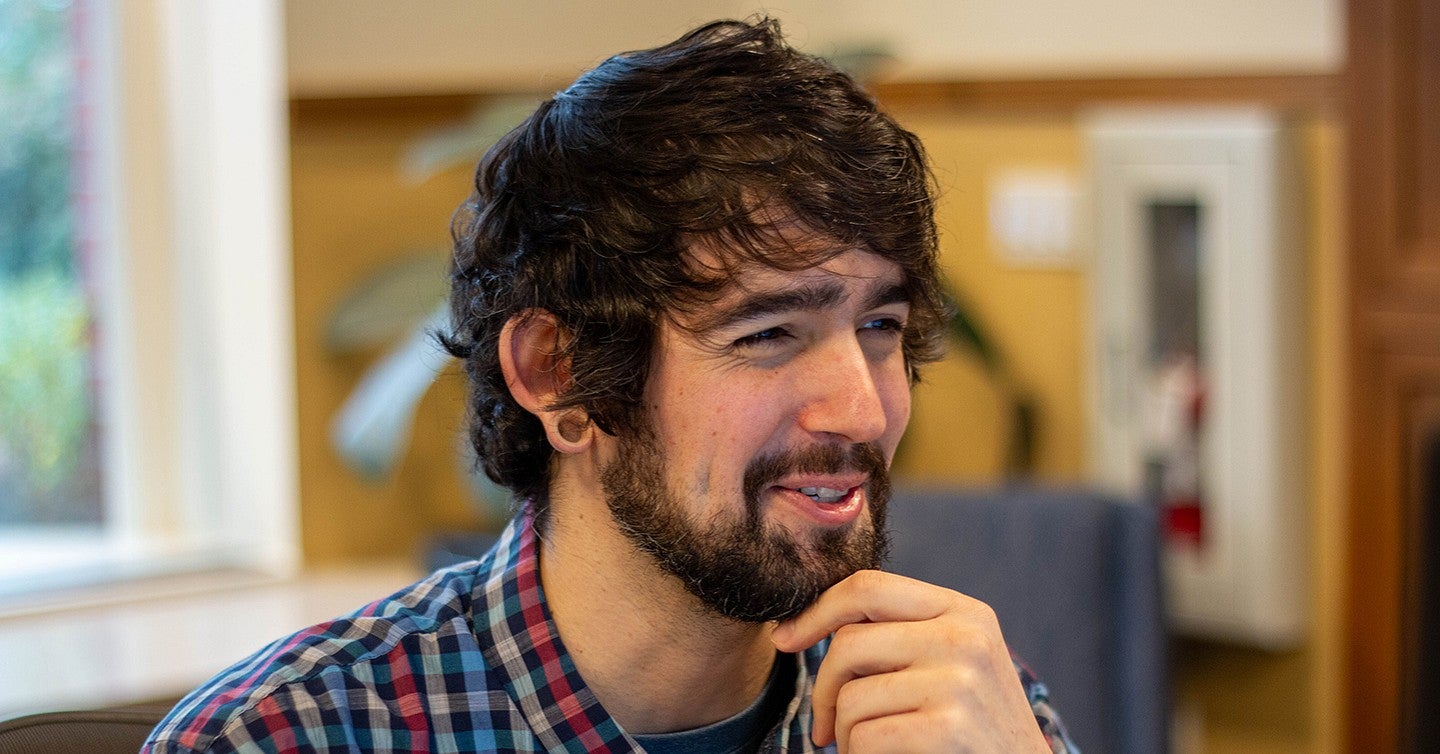
The man who makes Chapman Hall go
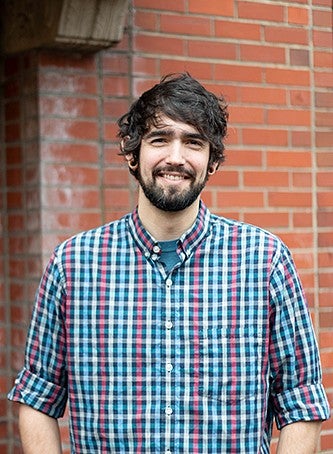
Hometown: Bend
Coffee or tea: Coffee. With that being said, I can never finish a full cup.
Quote you live by: I try not to hang on to things too tightly. I read a lot and I try to absorb ideas that are not necessarily staples for my brain. I try to expose myself to new ideas and try to remain open to ideas as they come.
Song on repeat: Lately, I’ve been listening to a lot of Grace Cummings.
If you could go anywhere in the world to look at art, it would be: France, to visit some of the heavy hitter museums over there.
Despite a dedicated art practice, a home studio he built himself, and a history of drawing Star Wars characters with crayons on the walls of his childhood home, Ryan Theiss does not consider himself an artist.
Instead, he sees himself as a person devoted to the creative process.
“Art is actually something that I can never remember not doing,” says Theiss, who serves as the office specialist for the Clark Honors College. “It’s not necessarily the end product that I find the value in. It’s really the process I get the most out of.”
At the CHC, Theiss’ day job is to keep Chapman Hall running. That means answering questions from faculty members and staff, mentoring student workers who are stationed at the front desk, and fixing whatever’s broken throughout the building.
Renée Dorjahn, CHC Associate Dean of Administration, is his supervisor and knows he has a tendency to shift credit to others. How does she describe Theiss? “Not afraid to lead, and very interested in enabling the success of all, Ryan is one of those employees who helps propel the University of Oregon forward in achieving its mission” she says.
In 2023, his work ethic, problem-solving skills and general attitude earned him one of UO’s Outstanding Employee Awards.
“While I believe that it takes the whole team, I suppose individual recognition does have a valuable place in the work force, despite my resistance to it,” Theiss says. “This is to say that I attempted to accept the award skillfully, with no ‘buts’ and just ‘thank you.’”
When the workday is over, Theiss heads home to the 1950s house he shares with his fiancée, Madie Hilton, where he’s built a home art studio. He spends hours there creating drawings inspired by nature, current events, and the chaos of everyday life.
We sat down with Theiss to talk about art as a form of catharsis, going back to school, and all the ways he learns from the students he mentors.
This interview was edited for clarity and length.
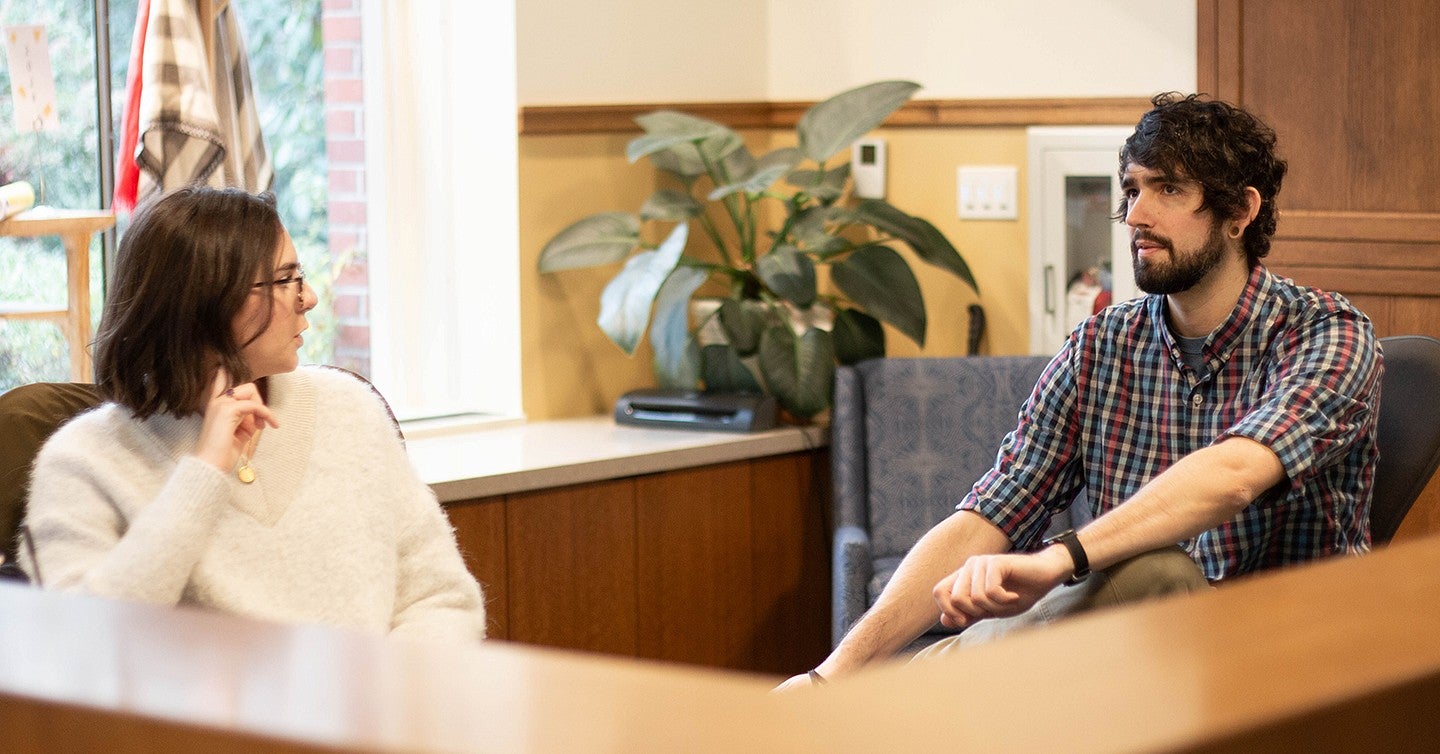
When you were younger, what did you want to be when you grew up?
I was never a very realistic child. I very much had an active imagination. So, I think the first thing I wanted to be was probably Darth Vader. But then I think once reality set in, I wanted to be a firefighter, and then an astronaut. As I got older, I decided I just wanted to make art.
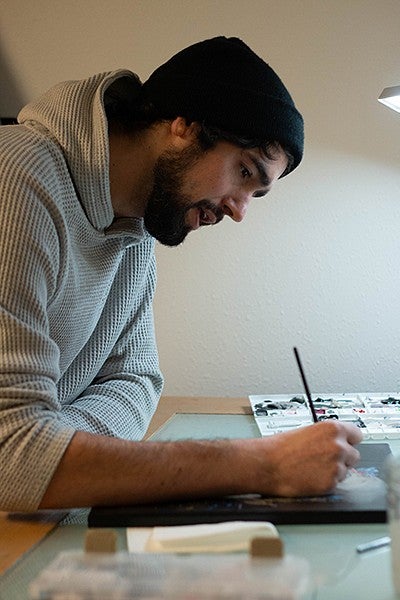
When did you start creating art?
There are pictures of me as a child getting into my grandmother’s paint. And you could never get me crayons because I’d draw all over the walls. I’ve been interested in art as long as I can remember. I’ve always had a sketchbook. So, it’s just something that I kind of grew up with. It was accepted. As I got older, you know, went to school and did art class and stuff like that. I kind of matured into some of the other mediums.
Now, I mostly do acrylic work. Drawing and painting have always been my passion, specifically graphite. I just love to do anything that isn’t real—sketches, concept work. I don’t know why I would want to sit down and spend a lot of time drawing something that you could just go out and look at, like a tree. So, I work very much from my imagination. My first love is always going to be graphite.
What types of things in the world do you look at to inspire your art?
Historically, I would get a lot of my inspiration from the disparities. I think a lot of my work has been fed off the discourse I would see in society, and then I’d have to translate that in some way. The best way for me to do that was through work, whether it be writing or painting. Lately, over the last few years, I’ve been trying to focus more on the positive side of art. And so my inspiration now is mostly from nature—anything that can get me excited and outside of myself, where I can touch on some type of beauty that’s outside of humanity.
Who in your life inspires you?
It sounds cliché, but my biggest inspirations are probably my parents. The older I get, the more I recognize traits in them that I really respect, whether it’s their work ethic, or my dad, who is just really creative. He’s a master carpenter who can just build anything out of wood.
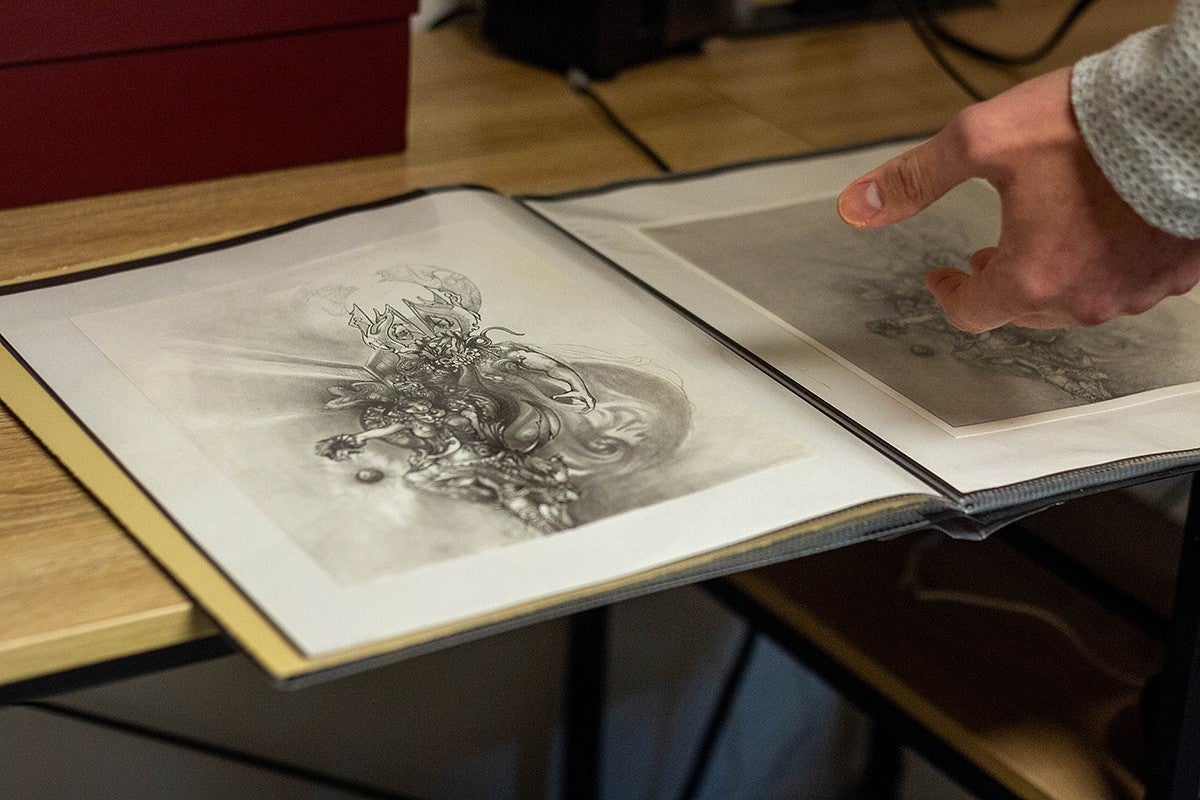
Your title at the Honors College is “Office Specialist II.” That sounds vague. How would you describe your role in the CHC and what you do?
I’m usually the person behind the desk who will help you find something or fix something that’s broken. But it takes a village here.
The way I view it is I’m a support mechanism. First and foremost, I’m here to support the student workers who work the front desk. But I’m also here to support them as students. I’m a resource for them to succeed here and to succeed outside the classroom. So, I act as a supervisor, as a friend, and an ally to them.
I have a history with management in the private sector, so management has always been something I’ve been drawn to. At the CHC, I’m navigating people’s different personalities and building a cohesive team that really thrives. It’s a team where we’re getting the job done, but still hopefully having some fun and getting to know each other as people, because at the end of the day, that’s what we are. People, not robots. We’re all individuals, and if you can’t bring that to the workplace, then what’s the point?
“I think a lot of my (art) work has been fed off the discourse I would see in society, and then I’d have to translate that in some way that makes sense to me.”
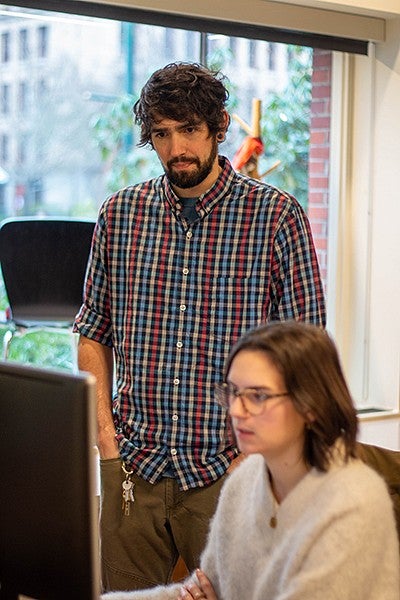
What do you learn from the people you mentor and work with there?
Everything. I mean, they’re mirrors. They’re individuals, but they also mirror back to me my behaviors and inclinations. I think you’re in a dangerous place when you think that for whatever reason, like age and stuff like that, you think you can’t learn anything from anybody. My students teach me things every day. Whether it just be conduct, what’s cool, how to navigate life. I learn from how they navigate things and what tools they have and what society deems as accessible. It keeps me limber, and it keeps me curious. They also teach me how to learn. I’m a full-time student as well, so I’m inspired by their passion for learning. It’s been so enlightening to me as I revisit education at a later time in my life.
Can you tell me more about your education journey?
When I was younger, I started at school studying English and creative writing. And then I thought, “I really love art. Maybe I should study art.” So, I transferred to a small college and tried to make art a profession. And it just took all the fun out of it. It took all the joy out of it. I decided very quickly that wasn’t the avenue I wanted to go down, and that I should keep art as my own practice.
Now, what I’m studying has nothing to do with art. I’m looking at computer science and business, and I’ve really been enjoying it.
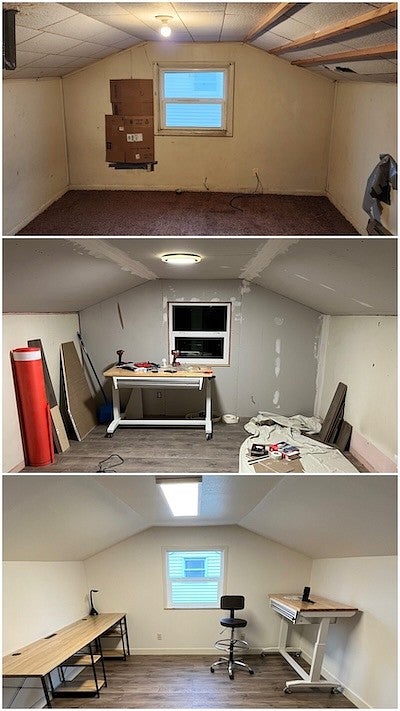
What's something you've made that you're really proud of?
If you spend 16 to 38 hours staring at one piece of art, by the end of it, while there are things about it that you are proud of, you’ll also know every single mistake. You know, every single detail that maybe wasn’t planned.
Ok then, if pride isn’t the right word for how you feel after completing a project, what word would you use instead?
I have two answers. I think one is a feeling of accomplishment. It’s a feeling of having done something from start to finish. It’s going through the ups and downs of the creative process, because that is rarely a straight road.
The other answer is that I feel a feeling of reverence. You’re touching and tapping into something universal. We’ve been creating pictures and art and things for millennia, our entire existence. And when we tap into that energy and do our own creative process, it benefits us and I think it benefits the people around us, too.
